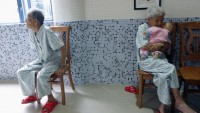Research Unravels Genetic Mystery of Breast and Ovarian Cancers
| Saranya Palanisamy | | Jul 17, 2015 03:20 AM EDT |
(Photo : Photo by Justin Sullivan/Getty Images) Research uncovers genetic mystery of breast and ovarian cancers.
Researchers from Francis Crick Institute, formerly known as UK Centre for Medical Research and Innovation, have come up with a breakthrough discovery in breast and ovarian cancers that scientists had been attempting to unravel for decades. Scientist from Francis Crick Institute funded by Cancer Research UK cracked the genetic cause of some of the breast and ovarian cancers.
Like Us on Facebook
"Understanding the nuts and bolts of cancer is vital if we are to beat this disease. This landmark discovery reveals another potential chink in cancer's armour - and it could help lead to more personalised treatments that take patients' genetic make-up into account and ultimately save more lives," noted Nell Barrie, senior science communications manager at Cancer Research UK, reported Cancer Research UK.
According to the study published in the journal Cell, the researchers conducted a study in nematodes for five long years to find that a protein called RAD15 is switched on by some key proteins to repair the cancer-causing DNA damaged in the cell. Proteins produced by genes RAD51, BRCA1 and BRCA2 in human work rigorously to fix the defects in DNA in case of damage. Women with defective or mutated BRCA1, BRCA2 and RAD51 are at an increased risk of developing breast and ovarian cancers.
RAD51 gene participates in common DNA repair process associated with double-strand DNA break and activation of homologous activation, noted UniProt. BReast-CAncer susceptibility gene-1 and BReast-CAncer susceptibility gene-2 respond to DNA damage by DNA repair and regulation of transcription, according to a study published in NCBI.
Though it was known earlier that defects in protein cousins of RAD51 also had an important role to play in enhancing cancer risk in women, the researchers were not sure of the mechanism involved. Fortunately, now the research team have discovered that the protein cousins boost the DNA repair mechanism by switching on the RAD51 by changing its shape.
Dr. Simon Boulton, lead author and group leader of the study, noted: "These protein cousins - known as paralogs - have been an enigma for about 30 years. But now we know they are right at the heart of repairing cell damage and helping to stop breast and ovarian cancers developing. In fact they have as vital a role as the more well-known BRCA genes in preventing the disease."
TagsCancer breakthrough, Ovarian Cancer, breast cancer, Cancer treatment, Cancer Research UK, Cancer
©2015 Chinatopix All rights reserved. Do not reproduce without permission
EDITOR'S PICKS
-

Did the Trump administration just announce plans for a trade war with ‘hostile’ China and Russia?
-

US Senate passes Taiwan travel bill slammed by China
-

As Yan Sihong’s family grieves, here are other Chinese students who went missing abroad. Some have never been found
-

Beijing blasts Western critics who ‘smear China’ with the term sharp power
-

China Envoy Seeks to Defuse Tensions With U.S. as a Trade War Brews
-

Singapore's Deputy PM Provides Bitcoin Vote of Confidence Amid China's Blanket Bans
-

China warns investors over risks in overseas virtual currency trading
-

Chinese government most trustworthy: survey
-

Kashima Antlers On Course For Back-To-Back Titles
MOST POPULAR
LATEST NEWS
Zhou Yongkang: China's Former Security Chief Sentenced to Life in Prison

China's former Chief of the Ministry of Public Security, Zhou Yongkang, has been given a life sentence after he was found guilty of abusing his office, bribery and deliberately ... Full Article
TRENDING STORY

China Pork Prices Expected to Stabilize As The Supplies Recover

Elephone P9000 Smartphone is now on Sale on Amazon India

There's a Big Chance Cliffhangers Won't Still Be Resolved When Grey's Anatomy Season 13 Returns

Supreme Court Ruled on Samsung vs Apple Dispute for Patent Infringement

Microsoft Surface Pro 5 Rumors and Release Date: What is the Latest?













